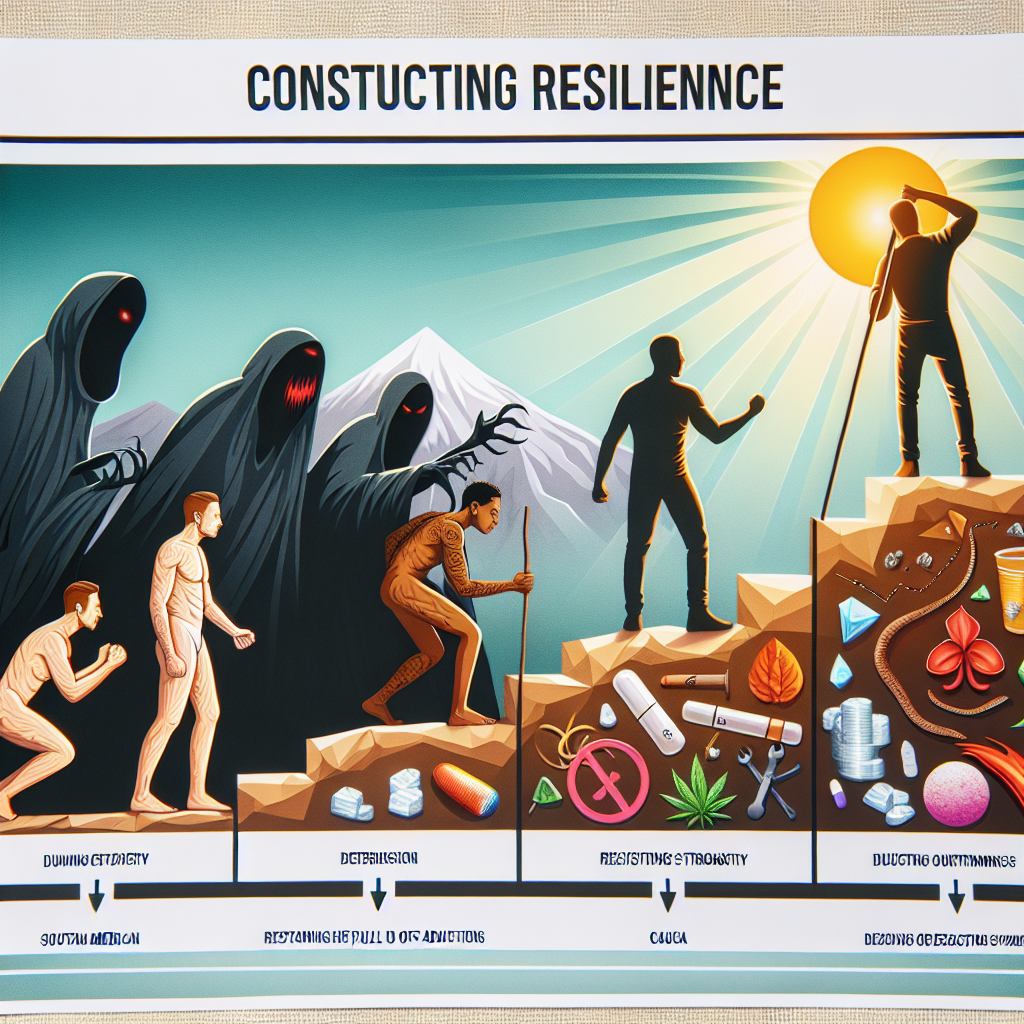-
Table of Contents

“Strengthen Your Resolve: Building Resilience for Lasting Addiction Recovery”
Introduction
Building resilience in addiction recovery is a crucial aspect of achieving and maintaining long-term sobriety. Resilience, the ability to bounce back from adversity, trauma, or significant stress, plays a vital role in overcoming the challenges associated with addiction. This introduction will explore the key components and strategies for fostering resilience during the recovery process. It will cover the importance of developing a strong support network, cultivating healthy coping mechanisms, setting realistic goals, and maintaining a positive mindset. By understanding and implementing these principles, individuals in recovery can enhance their ability to navigate setbacks, reduce the risk of relapse, and build a fulfilling, substance-free life.
Strategies for Building Emotional Resilience in Addiction Recovery
Building emotional resilience is a crucial component of addiction recovery, as it equips individuals with the strength to navigate the inevitable challenges and setbacks that arise. Resilience is not an innate trait but a skill that can be developed and honed over time. By adopting specific strategies, those in recovery can enhance their emotional resilience, thereby increasing their chances of long-term success.
One of the foundational strategies for building emotional resilience is cultivating a strong support network. Surrounding oneself with positive, understanding individuals can provide a sense of belonging and encouragement. This network can include family, friends, support groups, and therapists. Engaging in open and honest communication with these individuals can help alleviate feelings of isolation and provide a platform for sharing experiences and coping strategies. Moreover, participating in support groups allows individuals to connect with others who are facing similar challenges, fostering a sense of community and shared purpose.
In addition to building a support network, developing healthy coping mechanisms is essential for emotional resilience. Instead of turning to substances in times of stress, individuals can learn to manage their emotions through healthier outlets. Techniques such as mindfulness meditation, deep breathing exercises, and physical activity can help reduce stress and promote emotional well-being. Mindfulness meditation, in particular, encourages individuals to stay present and observe their thoughts and feelings without judgment, which can be incredibly grounding during turbulent times.
Another key aspect of building resilience is setting realistic and achievable goals. Recovery is a journey that requires time and patience, and setting small, manageable goals can provide a sense of accomplishment and motivation. These goals can be related to personal growth, such as learning a new skill or hobby, or they can be directly related to recovery, such as attending a certain number of support group meetings each week. Celebrating these small victories can boost self-esteem and reinforce the belief that progress is possible.
Furthermore, maintaining a healthy lifestyle is integral to emotional resilience. Proper nutrition, regular exercise, and adequate sleep all contribute to overall well-being and can significantly impact one’s emotional state. A balanced diet provides the necessary nutrients for brain function, while physical activity releases endorphins that improve mood. Adequate sleep is crucial for cognitive function and emotional regulation, making it easier to cope with stress and avoid relapse.
It is also important to practice self-compassion and forgiveness. Recovery is often accompanied by feelings of guilt and shame, but dwelling on past mistakes can hinder progress. Instead, individuals should strive to treat themselves with the same kindness and understanding they would offer a friend. Acknowledging that setbacks are a natural part of the recovery process and viewing them as opportunities for growth can foster a more resilient mindset.
Lastly, seeking professional help when needed is a sign of strength, not weakness. Therapists and counselors can provide valuable tools and insights for managing emotions and overcoming obstacles. Cognitive-behavioral therapy (CBT), for example, can help individuals identify and change negative thought patterns that contribute to emotional distress. Engaging in therapy can also provide a safe space to explore underlying issues that may have contributed to addiction in the first place.
In conclusion, building emotional resilience in addiction recovery involves a multifaceted approach that includes cultivating a support network, developing healthy coping mechanisms, setting achievable goals, maintaining a healthy lifestyle, practicing self-compassion, and seeking professional help. By embracing these strategies, individuals can enhance their ability to navigate the challenges of recovery and build a foundation for lasting sobriety.
The Role of Support Systems in Strengthening Resilience During Addiction Recovery
In the journey of addiction recovery, building resilience is a crucial component that can significantly influence the outcome. Resilience, the ability to bounce back from adversity, is not an inherent trait but a skill that can be developed and strengthened over time. One of the most effective ways to cultivate resilience is through robust support systems. These networks of care and encouragement play a pivotal role in helping individuals navigate the challenges of recovery, providing both emotional and practical assistance.
Support systems come in various forms, including family, friends, support groups, and professional counselors. Each of these elements contributes uniquely to the recovery process. Family and friends often serve as the first line of support, offering unconditional love and understanding. Their presence can provide a sense of stability and normalcy, which is essential for someone trying to rebuild their life. However, it is important to recognize that not all family dynamics are conducive to recovery. In such cases, seeking support outside the family becomes even more critical.
Support groups, such as Alcoholics Anonymous (AA) or Narcotics Anonymous (NA), offer a community of individuals who share similar experiences and challenges. These groups provide a safe space for sharing stories, struggles, and successes, fostering a sense of belonging and mutual understanding. The shared experiences within these groups can be incredibly validating, helping individuals realize they are not alone in their journey. Moreover, the structure and accountability provided by regular meetings can help individuals stay committed to their recovery goals.
Professional counselors and therapists also play a vital role in building resilience. They offer specialized knowledge and techniques to help individuals cope with stress, manage triggers, and develop healthy coping mechanisms. Cognitive-behavioral therapy (CBT), for instance, is a widely used approach that helps individuals identify and change negative thought patterns that can lead to relapse. By working with a professional, individuals can gain deeper insights into their behavior and develop personalized strategies for maintaining sobriety.
Transitioning from the importance of different support systems, it is essential to understand how these systems collectively contribute to resilience. One of the key ways they do this is by providing emotional support. Emotional support helps individuals feel valued and understood, which can significantly boost their self-esteem and confidence. When people feel supported, they are more likely to take positive risks, such as seeking employment or pursuing education, which can further enhance their resilience.
In addition to emotional support, practical support is equally important. This can include assistance with daily tasks, financial support, or help with finding housing. Practical support alleviates some of the external pressures that can make recovery more challenging, allowing individuals to focus more on their personal growth and healing. For example, knowing that they have a safe place to live can reduce anxiety and provide a stable foundation from which to build a new life.
Furthermore, support systems can help individuals develop a sense of purpose and direction. Engaging in meaningful activities, whether through work, volunteering, or hobbies, can provide a sense of accomplishment and fulfillment. Support systems can encourage and facilitate these activities, helping individuals set and achieve goals that are aligned with their values and interests.
In conclusion, the role of support systems in strengthening resilience during addiction recovery cannot be overstated. By offering emotional and practical support, fostering a sense of belonging, and helping individuals find purpose, these networks play an indispensable role in the recovery process. Building resilience is a journey, and with the right support systems in place, individuals can navigate the challenges of recovery with greater confidence and hope for the future.
Q&A
1. **Question:** What are some effective strategies for building resilience in addiction recovery?
**Answer:** Effective strategies for building resilience in addiction recovery include developing a strong support network, practicing mindfulness and stress management techniques, setting realistic goals, maintaining a healthy lifestyle, and seeking professional counseling or therapy.
2. **Question:** How can mindfulness help in building resilience during addiction recovery?
**Answer:** Mindfulness helps in building resilience during addiction recovery by promoting self-awareness, reducing stress, improving emotional regulation, and enhancing the ability to cope with cravings and triggers.
Conclusion
Building resilience in addiction recovery involves several key strategies: developing a strong support network, engaging in regular physical activity, practicing mindfulness and stress management techniques, setting realistic goals, maintaining a healthy lifestyle, seeking professional help when needed, and fostering a positive mindset. By integrating these practices, individuals can enhance their ability to cope with challenges, reduce the risk of relapse, and sustain long-term recovery.



